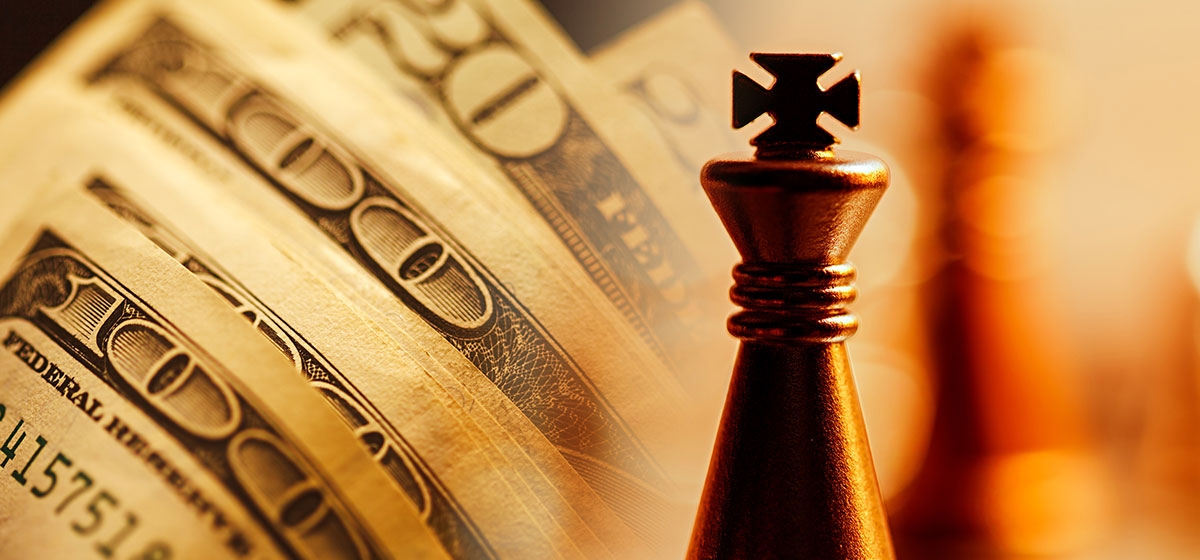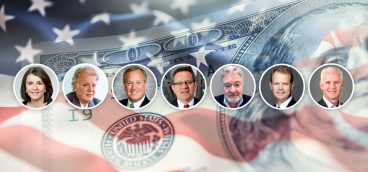Cash is King

Since the end of the Financial Crisis eight long years ago, a notion has settled across the land that “cash is trash.” This is the bunkmate of the “TINA” principle: There Is No Alternative to owning equities.
It’s easy to understand how these ideas took root. Since the Bear Market ended in early 2009 stocks have been on a tear. Our friendly central bankers have produced one of the great Bull Markets in US history, although this seems to have distracted them from the need to grow the economy. Meanwhile, cash, near-cash and even longer bonds have yielded almost nothing. Ergo, cash is trash and There Is No Alternative to owning stocks.
Before demolishing this nonsense, let’s quickly look at what I mean by “cash.”
I don’t, certainly, just mean paper currency, but you might be surprised to hear that I include paper currency. Over the years I’ve worked with a surprising number of families who keep large amounts of currency on hand. In one case, the number was $10 million, held in US dollars and Swiss francs. Even many middle income families keep $10,000 or so around just in case.
Physical currency presents problems, of course: you have to store it and see to its security, and countries have the annoying habit of eliminating or changing their bills. When I first began working with families in the mid-1970s they were still frosted about the US Treasury’s decision to discontinue the one thousand and five hundred dollar bills (in 1969). And before the families stopped being mad about that, the dammed Treasury changed the appearance of the one hundred dollar bill in 1990, 1996 and again in 2013. Don’t those bozos know how difficult it is to exchange $10 million in physical currency for new bills without anyone noticing?
Not sure how I got off on that topic… Anyway, what I mean by “cash” is really anything that is extremely liquid, has little credit risk associated with it, and has minimal duration risk. In other words, this isn’t an Armageddon idea, just a precautionary and opportunistic idea. Therefore: physical currency, bank accounts, high quality money market funds, short-term certificates of deposit, Treasury bills and even shorter term Treasury notes or Treasury bond funds.
Of course, I’m certainly not suggesting that investors put all their capital in cash. Investors everywhere and always should own diversified portfolios, at least until they reach roughly age 80—and even after that for most people, since they are really investing for the next generation (unless they need liquidity to pay estate taxes).
No, what I’m suggesting is that investors should hold 5% to 10% of their portfolios in cash, or, alternatively, about three years of spending. Most financial crises and Bear Markets last less than three years, and therefore the cash allows us to sleep better at night, to avoid making dumb decisions in a moment of panic, and to take advantage of investment opportunities without having to sell something and pay taxes.
But the key problem with the cash-is-trash/TINA notions is that they are ex post ideas masquerading as ex ante ideas. That is to say that they are presented as good ideas for portfolios today, when in fact they are ideas that worked out only in hindsight.
It’s true enough that we’ve been in a long Bull Market for stocks while “cash” (as I’ve defined it) has returned virtually nothing. But so what? Any idiot can look back eight years and tell us what we should have bought. We should have bought US large cap stocks and nothing else. We should have, in particular, bought the FAAANs: Facebook, Apple, Amazon, Alphabet, and Netflix—a full 50% of the return of US stocks has been accounted for by those five names.
But let’s ask ourselves two intelligent questions. First, forget looking backwards. Let’s put ourselves in the shoes of a thoughtful investor eight years ago and ask what, at that time looking forward, i.e., ex ante, were the sensible things to buy? Second, let’s put ourselves in the shoes of a thoughtful investor today and ask what we should be buying now. The answer to both questions, it turns out, is the same.
At the time—say, early 2009—if we looked forward we could have imagined a wide variety of futures for the US and world economies and for the equity and fixed income markets. One of those futures might, in fact, have been “an historic Bull Market in stocks during which tech stocks would soar higher (relative to value stocks) than during the Tech Boom and during which bonds and cash would earn nothing and the economy would barely grow.” But what were the odds?
Another future we might have imagined was “a 1930s-style Depression coincident with The Mother of All Bear Markets and where nothing is worth owning but cash and gold.” But, again, what were the odds?
Thoughtful investors came down somewhere in-between these two extremes, neither positioning their portfolios for a raging Bull Market nor for a hideous Bear Market. As it turned out, one of the extremes did come to pass, and a small group of happy morons who bet on that outcome made a lot of money. Well, that’s nice for them, but it doesn’t make them good investors, it makes them lucky investors.
Consider a fellow we’ll call Lucky Larry. He goes to Vegas and plays roulette, betting black five times in a row. He runs the table. Is Larry a genius? Probably not. Before Larry started playing roulette there were a whole bunch of potential future outcomes at the roulette wheel, including the possibility that black would come up five times in a row. But what were the odds? Can Larry do it again? No. In fact, Larry tried so hard to do it again that he went bust and had to change his name to Larry the Loser.
Or consider, closer to the investment world, fellows (and gals) who make one big call, make a fortune, attract billions of dollars from gullible investors, produce a terrible track record, lose all their investors, and end up just managing their own money. I’m not mentioning any names, but each of these folks has, as we like to say in the law business, a fool for a Limited Partner.
The sensible thing to do in early 2009, when prices were very low but could have gone lower, and where the odds were also low of a Bull Market with a flat economy, was to hold some cash. The sensible thing to do now, when prices are very high and are likely to go lower, and where the odds of a Bear Market climb every day, is to hold some cash. Hence, Cash Is King.
Next up: Democracy, Populism and the Tyranny of the Experts





